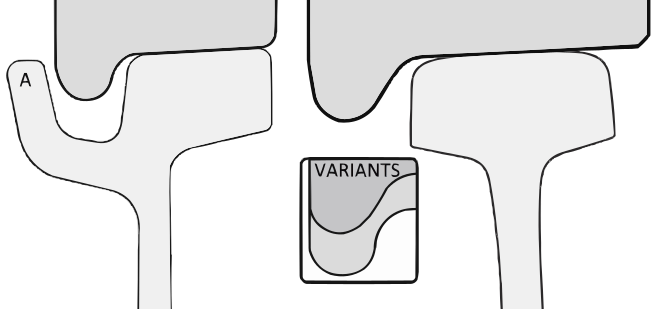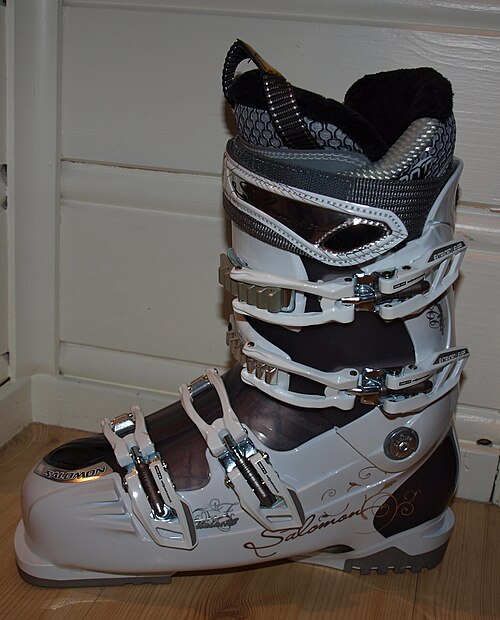Ribnoun
Any of a series of long curved bones occurring in 12 pairs in humans and other animals and extending from the spine to or toward the sternum
Ribnoun
A part or piece, similar to a rib, and serving to shape or support something
Ribnoun
A cut of meat enclosing one or more rib bones
Ribnoun
(nautical) Any of several curved members attached to a ship's keel and extending upward and outward to form the framework of the hull
Ribnoun
Any of several transverse pieces that provide an aircraft wing with shape and strength
Ribnoun
(architecture) A long, narrow, usually arched member projecting from the surface of a structure, especially such a member separating the webs of a vault
Ribnoun
(knitting) A raised ridge in knitted material or in cloth
Ribnoun
(botany) The main, or any of the prominent veins of a leaf
Ribnoun
A teasing joke
Ribnoun
A single strand of hair.
Ribnoun
A stalk of celery.
Ribnoun
(archaic, literary, humorous) A wife or woman.
Ribverb
To shape, support, or provide something with a rib or ribs.
Ribverb
To tease or make fun of someone in a good-natured way.
Ribverb
To enclose, as if with ribs, and protect; to shut in.
Ribverb
(transitive) To leave strips of undisturbed ground between the furrows in ploughing (land).
Ribnoun
One of the curved bones attached to the vertebral column and supporting the lateral walls of the thorax.
Ribnoun
That which resembles a rib in form or use.
Ribnoun
The chief nerve, or one of the chief nerves, of a leaf.
Ribnoun
In Gothic vaulting, one of the primary members of the vault. These are strong arches, meeting and crossing one another, dividing the whole space into triangles, which are then filled by vaulted construction of lighter material. Hence, an imitation of one of these in wood, plaster, or the like.
Ribnoun
Solid coal on the side of a gallery; solid ore in a vein.
Ribnoun
A wife; - in allusion to Eve, as made out of Adam's rib.
Ribverb
To furnish with ribs; to form with rising lines and channels; as, to rib cloth.
Ribverb
To inclose, as with ribs, and protect; to shut in.
Ribnoun
support resembling the rib of an animal
Ribnoun
any of the 12 pairs of curved arches of bone extending from the spine to or toward the sternum in humans (and similar bones in most vertebrates)
Ribnoun
cut of meat including one or more ribs
Ribnoun
a teasing remark
Ribnoun
a riblike supporting or strengthening part of an animal or plant
Ribnoun
a projecting molding on the underside of a vault or ceiling; may be ornamental or structural
Ribverb
form vertical ribs by knitting;
Ribverb
subject to laughter or ridicule;
Rib
In vertebrate anatomy, ribs (Latin: costae) are the long curved bones which form the rib cage, part of the axial skeleton. In most tetrapods, ribs surround the chest, enabling the lungs to expand and thus facilitate breathing by expanding the chest cavity.
Flangenoun
An external or internal rib or rim, used either to add strength or to hold something in place.
Flangenoun
The projecting edge of a rigid or semi-rigid component.
Flangenoun
(RPG) An ability in a role-playing game which is not commonly available, overpowered or arbitrarily imposed by the referees.
Flangenoun
A vulva.
Flangenoun
The collective noun for a group of baboons.
Flangenoun
The electronic sound distortion produced by a flanger.
Flangeverb
(intransitive) To be bent into a flange.
Flangeverb
(transitive) To make a flange on; to furnish with a flange.
Flangeverb
To mix two copies of together, one delayed by a very short, slowly varying time.
Flangenoun
An external or internal rib, or rim, for strength, as the flange of an iron beam; or for a guide, as the flange of a car wheel (see Car wheel.); or for attachment to another object, as the flange on the end of a pipe, steam cylinder, etc.
Flangenoun
A plate or ring to form a rim at the end of a pipe when fastened to the pipe.
Flangeverb
To make a flange on; to furnish with a flange.
Flangeverb
To be bent into a flange.
Flangenoun
a projection used for strength or for attaching to another object
Flange
A flange is a protruded ridge, lip or rim, either external or internal, that serves to increase strength (as the flange of an iron beam such as an I-beam or a T-beam); for easy attachment/transfer of contact force with another object (as the flange on the end of a pipe, steam cylinder, etc., or on the lens mount of a camera); or for stabilizing and guiding the movements of a machine or its parts (as the inside flange of a rail car or tram wheel, which keep the wheels from running off the rails). The term is also used for a kind of tool used to form flanges.










